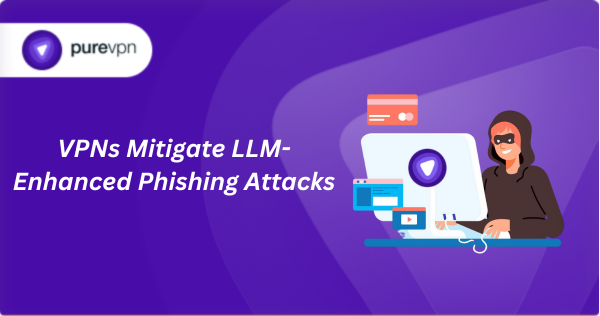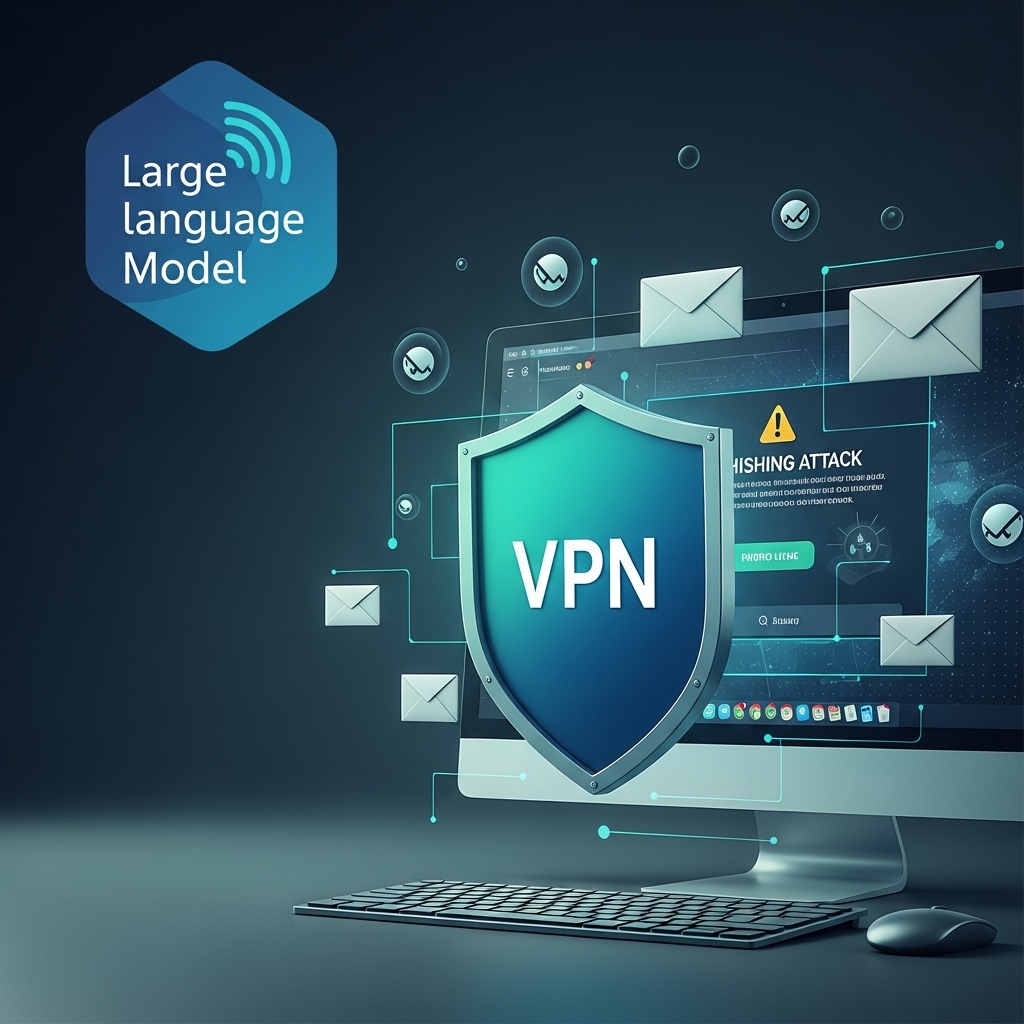Phishing attacks are getting smarter. With the rise of Large Language Models (LLMs), cybercriminals are now using AI to craft emails and messages that are not only convincing but also highly personalized, making phishing harder to detect, even for the most vigilant users.
While a Virtual Private Network (VPN) won’t stop a phishing attack directly, it can certainly play a role in minimizing risk and protecting your data. In this blog, we’ll explore how VPNs stack up against LLM-enhanced phishing attacks and whether they can offer any real protection.

What are LLM-enhanced phishing attacks?
LLM-enhanced phishing attacks are cyber scams where attackers use AI-powered tools like GPT to create highly convincing phishing emails and fake websites. These AI models can generate personalized messages that are tailored to specific targets, making the phishing attempt appear legitimate and much harder to detect.
The attack’s success relies not on exploiting technical vulnerabilities, but rather on manipulating human behavior. This makes traditional security tools such as firewalls and antivirus software less effective. LLMs make these attacks more sophisticated, increasing the risk to personal data and business assets.
What is a VPN and how does it work?
A VPN creates a secure connection between your device and the internet. It works by encrypting your internet traffic, meaning your data is scrambled so that it cannot be intercepted or read by third parties, especially on public Wi-Fi. It also masks your IP address, making it harder for websites or hackers to track your online activities.
However, VPNs don’t directly prevent phishing and can’t stop phishing emails or fake websites from reaching you. Plus, they won’t recognize or block fraudulent messages designed to trick you into revealing information as these tools don’t address the core of phishing attacks, which rely on social engineering and deceptive tactics.
How VPNs stack up against LLM-enhanced phishing attacks
VPNs are designed to improve your privacy and security on the internet, but when it comes to LLM-enhanced phishing attacks, their role is more about reducing or mitigating risk than preventing the attack entirely.
These tools can mask your IP address, making it harder for attackers to pinpoint and target you based on your location. This can offer some security against location-based phishing attacks, but LLM-enhanced phishing is more focused on social engineering.
Furthermore, VPNs also keep your personal data on unsecured networks safe by encrypting your internet traffic and preventing man-in-the-middle attacks. However, LLM-enhanced phishing doesn’t rely on network vulnerabilities.
While VPNs provide valuable protection, they don’t address the core issue of phishing, which is the manipulation of the user. Therefore, staying safe from LLM-enhanced phishing attacks requires taking additional security measures.

Configuring VPNs to mitigate LLM-enhanced phishing attacks
As mentioned earlier, VPNs can’t directly prevent LLM-enhanced phishing attacks, but they can play a role in reducing the risk by securing your connection and masking your identity. Here are some best practices for configuring your VPN to maximize its security benefits:
- Use strong encryption protocols: Choose VPNs that offer strong encryption like AES-256 or newer protocols such as WireGuard or OpenVPN. These provide robust protection against data interception, especially on unsecured networks.
- Enable kill-switch: Activate the kill switch feature to automatically disconnect your internet if the VPN connection drops. That way, your device is prevented from switching to an unsecured connection and exposing you to phishing threats.
- Cover all your devices: Make sure your VPN is set up on all devices you use to browse the internet like smartphones, tablets, and laptops to reduce the chances of an attacker targeting an unprotected device.
- Use split tunneling: To optimize performance without compromising security, enable split tunneling to route sensitive activities like banking through the VPN, while allowing other traffic to go through your regular connection.
- Activate DNS and IP leak protection: Configure your VPN to prevent DNS leaks and IP leaks, so your true IP address and browsing data aren’t exposed, even if the VPN connection experiences an issue.
While these steps improve your overall security and privacy, LLM-enhanced phishing attacks still require additional measures, such as installing anti-phishing software, setting up email filters, and staying up-to-date on how to recognize and prevent phishing attempts.
Why PureVPN Password Manager is Your AI-aware Phishing Defense
- Stores strong, unique passwords so attackers can’t reuse credentials even if phishing tricks you.
- Auto-fills login only on correct sites, helping avoid fake/phishing websites.
- Alerts you if a password appears in a data breach.
- Adds a layer of protection beyond VPN + MFA for your accounts by securing credentials themselves.
Combining VPNs with other security measures to defend against phishing
To build a more robust defense against phishing, especially LLM-enhanced phishing attacks, VPNs should be used in conjunction with other security measures. Here’s how you can strengthen your defense:
Anti-phishing software
Anti-phishing software can detect and block phishing emails before they reach your inbox. It often works by scanning incoming emails for known malicious links, suspicious attachments, and phishing signatures, and blocking them.
Many anti-phishing tools now also use behavioral analysis to spot suspicious patterns in emails, helping to identify new phishing techniques. When used alongside a VPN, it adds a layer of protection against deceptive emails that a VPN alone can’t prevent.
Email filtering and spam protection
Configuring your email client to filter out spam and suspicious emails can significantly reduce the number of phishing attempts you encounter. Many email providers offer built-in features that automatically filter out phishing emails based on specific criteria.
However, it’s also worth adding custom rules to catch more subtle threats. This can include filtering based on keywords, domain blacklists, or new patterns in phishing emails, which can evolve rather quickly.
Multi-factor authentication (MFA)
Multi-factor authentication adds an essential layer of protection by requiring users to verify their identity using more than just a password, often through a code sent to their phone or an app such as Google Authenticator.
Even if attackers manage to trick users into revealing their login credentials via phishing, MFA ensures that they can’t gain full access without the second factor. While SMS-based MFA is still commonly used, authentication apps or hardware tokens like YubiKey are more secure.
Web browser security features
Many modern web browsers offer built-in phishing protection by warning users if they are about to visit a malicious website. These tools help prevent users from unknowingly entering personal information on fraudulent websites.
Browsers typically use services like Google Safe Browsing or PhishTank to flag and warn about dangerous sites. Pairing this with a VPN ensures that even if a user clicks on a phishing link, they are protected from man-in-the-middle attacks or data interception.
User awareness and training
Regular training helps individuals recognize phishing attempts, whether they come through email, social media, or fake websites. Educating employees and individuals on how to spot suspicious emails, malicious links, and phishing websites is critical.
Furthermore, simulated phishing campaigns and ongoing security awareness workshops can also help maintain high levels of caution among users, lowering the chances of falling victim to phishing attacks.
Final word
While VPNs play an important role in enhancing privacy and securing data, they are not a complete defense against LLM-enhanced phishing attacks. These attacks rely on social engineering and manipulation, which VPNs do not address directly.
However, when used alongside other security measures like anti-phishing software, email filtering, multi-factor authentication, and user education, VPNs can form part of a comprehensive defense strategy.





